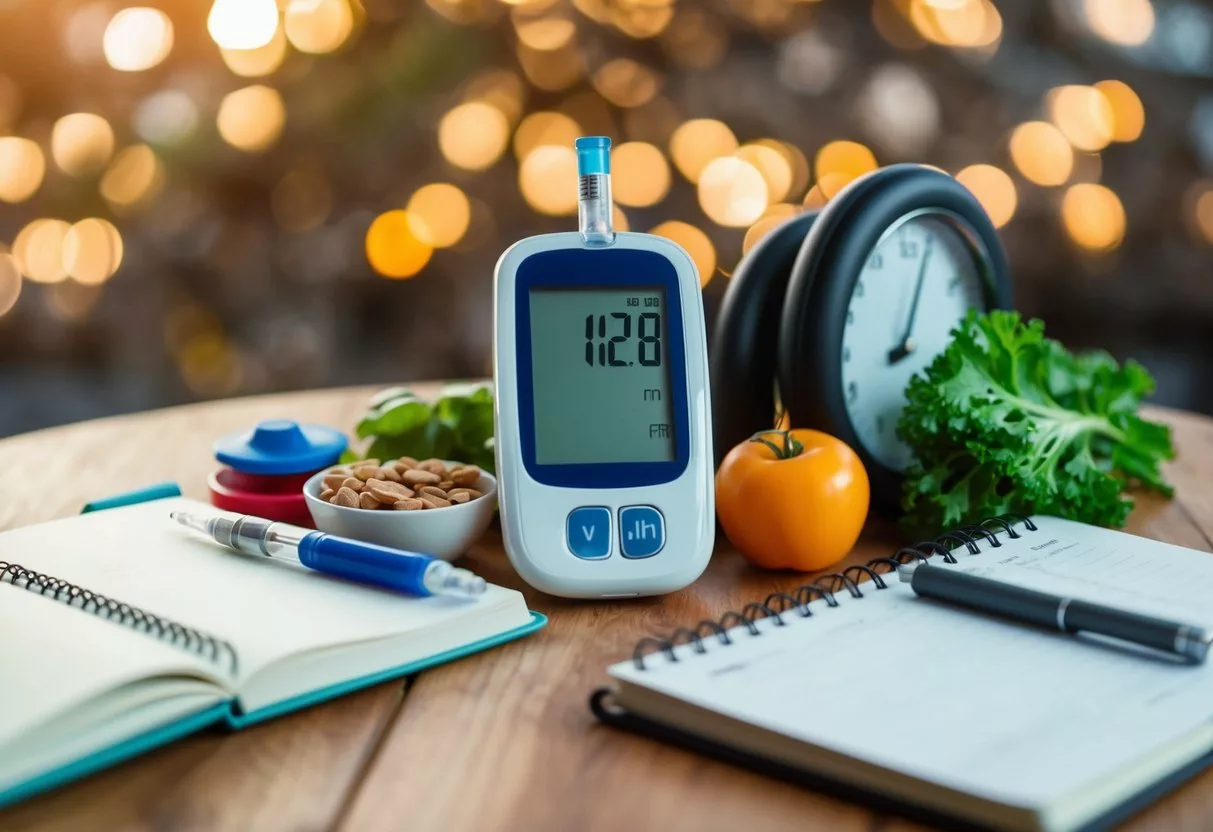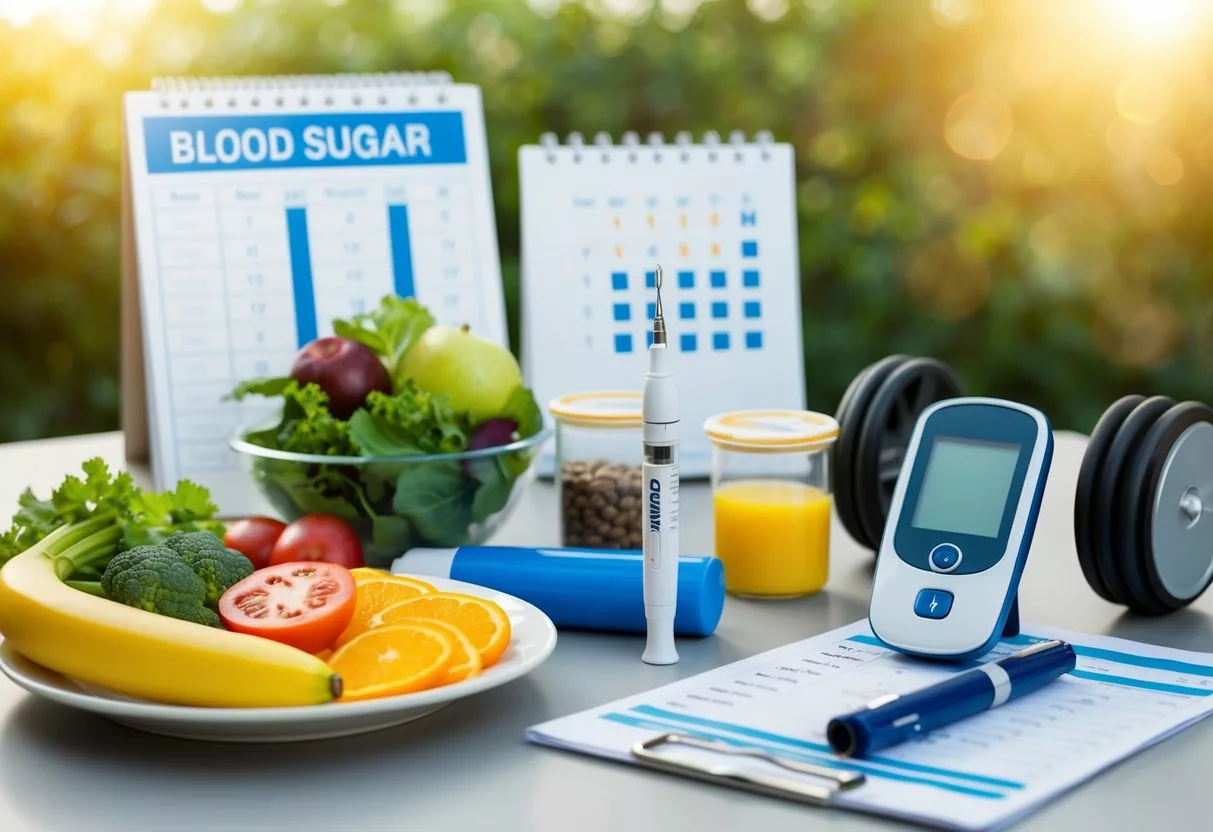Diabetes can be a tough condition to manage. It affects many parts of life and requires daily attention. Luckily, there are programs that can help people with diabetes take charge of their health.

Diabetes Self-Management Education and Support (DSMES) programs teach people how to control their blood sugar, eat well, and stay active. These programs are led by experts who know a lot about diabetes care. They give tips on checking blood sugar, taking medicine, and dealing with stress.
People who join these programs often see big improvements. They learn skills to handle diabetes every day. This can lead to better health and fewer problems from diabetes. With the right support, many find it easier to make good choices and feel more in control of their lives.
Understanding Diabetes

Diabetes is a chronic condition that affects how the body processes glucose. It comes in different forms and requires careful management to prevent complications.
Types and Pathophysiology
Type 1 diabetes is an autoimmune disorder. The body attacks insulin-producing cells in the pancreas. This leads to little or no insulin production.
Type 2 diabetes is more common. The body becomes resistant to insulin or doesn’t make enough. This causes high blood sugar levels.
Gestational diabetes occurs during pregnancy. It usually goes away after birth but increases the risk of type 2 diabetes later.
The pathophysiology of diabetes involves impaired insulin production, insulin resistance, and abnormal glucose metabolism. These factors lead to high blood sugar, which can damage organs over time.
Importance of Diabetes Management
Good diabetes management is crucial. It helps prevent serious health issues like:
- Heart disease
- Kidney damage
- Vision problems
- Nerve damage
Diabetes self-management education is key. It teaches people how to:
- Monitor blood sugar
- Take medications correctly
- Make healthy food choices
- Stay physically active
Proper management can improve quality of life. It also reduces the risk of complications and lowers healthcare costs.
Regular check-ups with healthcare providers are important. They help catch and address problems early.
Components of Diabetes Self-Management

Living with diabetes requires daily care and attention. Effective self-management involves learning about the condition, making lifestyle changes, and working closely with healthcare providers.
Education and Support
Diabetes self-management education is key to empowering patients. It covers topics like blood sugar monitoring, meal planning, and medication use. Patients learn to recognize and respond to symptoms of high or low blood sugar.
Support groups offer a space to share experiences and coping strategies. Many find comfort in connecting with others facing similar challenges.
Online resources and mobile apps provide accessible information and tools for tracking diabetes-related data. These digital aids can help patients stay on top of their care between doctor visits.
Physical Activity and Nutrition
Regular exercise helps control blood sugar levels and improves overall health. Experts recommend at least 150 minutes of moderate-intensity aerobic activity per week.
Activities can include:
- Brisk walking
- Swimming
- Cycling
- Strength training
Healthy eating is crucial for managing diabetes. A balanced diet should include:
- Whole grains
- Lean proteins
- Fruits and vegetables
- Healthy fats
Portion control and carbohydrate counting are important skills for maintaining stable blood sugar. Working with a dietitian can help create a personalized meal plan.
Monitoring and Medication
Regular blood glucose monitoring is essential. It helps patients understand how food, activity, and medication affect their levels.
Common monitoring tools include:
- Glucose meters
- Continuous glucose monitors (CGMs)
- A1C tests
Proper medication management is critical. This may involve:
- Oral medications
- Insulin injections
- Insulin pumps
Patients must learn correct dosing and timing of medications. They should also understand potential side effects and how to adjust treatment when needed.
Regular check-ups with healthcare providers ensure the treatment plan remains effective. Patients should discuss any concerns or changes in their condition promptly.
Diabetes Self-Management Education and Support (DSMES)

DSMES helps people with diabetes learn to manage their condition. It gives them skills to handle daily care and make good choices. DSMES can lead to better health and fewer problems from diabetes.
Goals and Curriculum
DSMES programs teach key self-care skills. These include checking blood sugar, eating well, and staying active. People learn how to take their medicine the right way. They also find out how to spot and fix problems early.
The lessons cover how to set goals and solve issues. Patients learn to cope with stress and feelings about diabetes. DSMES helps them work well with their health care team.
Classes may be one-on-one or in groups. Some are online. The teacher is often a nurse or dietitian who knows a lot about diabetes.
Access and Utilization
Many people can get DSMES, but not all do. Doctors should tell patients about these classes. Insurance often pays for DSMES, which makes it easier to use.
Accredited DSMES programs can be found in many places. They may be at hospitals, clinics, or community centers. Some are held at work or school. People can also get DSMES through phone calls or video chats.
It’s best to start DSMES soon after being told you have diabetes. But it can help at any time, like when treatment changes. Regular DSMES can keep people on track with their care.
Professional Guidance in Diabetes Care

Managing diabetes effectively requires expert guidance and support. Diabetes educators and health care providers play crucial roles in helping patients navigate their condition and develop personalized care plans.
Diabetes Educators
Diabetes care and education specialists are trained professionals who help people with diabetes learn to manage their condition. They teach patients about:
- Blood sugar monitoring
- Medication management
- Healthy eating habits
- Exercise routines
- Stress reduction techniques
These experts provide one-on-one counseling and group classes. They help patients set realistic goals and develop strategies to achieve them.
Diabetes educators work closely with doctors and other health care providers. They help bridge the gap between medical advice and daily diabetes management.
Role of Health Care Providers
Health care providers are essential in diabetes care. They include:
- Primary care physicians
- Endocrinologists
- Nurse practitioners
- Pharmacists
These professionals diagnose diabetes and create treatment plans. They prescribe medications and monitor patients’ overall health.
Health care providers conduct regular check-ups to assess diabetes control. They order lab tests and adjust treatment as needed.
They also screen for diabetes-related complications and provide referrals to specialists when necessary. Providers work with patients to set treatment goals and track progress over time.
Blood Sugar Regulation and Tracking

Managing blood sugar levels is key for people with diabetes. Regular monitoring and quick action help keep glucose in a healthy range.
Glucose Monitoring Techniques
Blood glucose monitoring is vital for diabetes management. Traditional methods use finger prick tests and glucose meters. These give a snapshot of blood sugar at that moment.
Newer technology offers more options. Continuous glucose monitors (CGMs) use a small sensor under the skin. They check glucose levels every few minutes. This gives a fuller picture of blood sugar trends.
Some CGMs connect to smartphones. This lets users track their data easily. Many diabetes apps can store and analyze glucose readings. They may also track food, exercise, and medication.
Dealing with Hypo- and Hyperglycemia
Hypoglycemia is low blood sugar. Signs include shakiness, confusion, and sweating. Quick action is needed. Eating fast-acting carbs like juice or glucose tablets can help.
Hyperglycemia is high blood sugar. It may cause thirst, frequent urination, and blurry vision. Treatment depends on the cause. It might involve taking insulin or adjusting medication.
Regular blood sugar checks help catch these issues early. Having a plan for both high and low blood sugar is important. This plan should be made with a doctor’s help.
Exercise, diet, and stress all affect blood sugar. Keeping a log of these factors can help spot patterns. This makes it easier to prevent extreme highs and lows.
Medical Nutrition Therapy (MNT)

Medical Nutrition Therapy is a key part of diabetes care. It helps people eat better and control their weight. MNT can make a big difference in blood sugar levels and overall health.
Dietary Strategies
MNT focuses on personalized meal plans that fit each person’s needs. A dietitian helps create these plans. They teach about good food choices and portion sizes.
Carb counting is a big part of MNT. It helps people know how much insulin they need. Eating more fiber and less added sugar is also important.
MNT plans often include lots of veggies, whole grains, and lean proteins. These foods help keep blood sugar steady. Timing meals and snacks can also help control blood sugar spikes.
Weight Management
For many with diabetes, losing weight can really help. Even small weight loss can improve blood sugar control.
MNT gives tips on how to cut calories without feeling hungry.
Exercise is part of weight management too. A dietitian can suggest ways to be more active.
They might advise walking more or joining a gym.
Portion control is key for weight loss. MNT teaches how to use smaller plates and measure food.
It also covers healthy cooking methods like baking instead of frying.
Some people might use meal replacements as part of their plan. These can help with portion control and weight loss.
Medicare and Insurance Coverage for Diabetes

Medicare and private insurance offer coverage for many diabetes-related services and supplies. The extent of coverage varies, but both aim to help manage costs for people with diabetes.
Financial Aspects of Care
Medicare covers diabetes supplies like blood sugar monitors, test strips, and insulin pumps. Some costs may still apply, such as copayments or deductibles.
Many private insurance plans also cover diabetes supplies, but coverage details can differ.
It’s important to check with the specific plan for exact benefits.
For insulin, Medicare Part D plans offer coverage. Monthly copays are capped at $35 for covered insulin products in 2023.
DSMES Services Coverage
Medicare covers Diabetes Self-Management Education and Support (DSMES) services. These programs help people learn to manage their diabetes effectively.
DSMES coverage includes:
- 10 hours of initial training
- 2 hours of follow-up training each year
To qualify, patients need a referral from their doctor. Most private insurance plans also cover DSMES, but the specifics can vary by plan.
Some plans may require pre-authorization or have limits on the number of covered sessions.
It’s best to check with the insurance provider for details.
Advanced Approaches to Diabetes Treatment

New methods are changing how we treat diabetes. These approaches focus on better care in emergencies and new ways to manage the disease day-to-day.
Emergency Preparedness
People with diabetes need to be ready for emergencies. They should always have a kit with supplies.
This kit should have insulin, syringes, and glucose tablets. It’s also good to have a glucagon kit for low blood sugar.
Wearing a medical ID is important. It tells others about your diabetes if you can’t speak.
In an emergency, call for help right away. Don’t wait if you feel very sick.
Know the signs of diabetic ketoacidosis. This is a serious problem that needs fast treatment.
Signs include very high blood sugar, feeling very thirsty, and trouble breathing.
Innovations in Diabetes Care
New tools are making diabetes care easier. Continuous glucose monitors check blood sugar all day and night. Some can even send alerts to your phone.
Insulin pumps are getting better too. Some work with glucose monitors to give just the right amount of insulin. This is called an artificial pancreas system.
There are also new medicines. Some help the body make more insulin. Others help the body use insulin better.
These new drugs can help control blood sugar with fewer side effects.
Diabetes self-management training (DSMT) is also improving. It now uses apps and online classes.
These make it easier for people to learn about their diabetes and how to take care of it.
Preventing and Managing Diabetes Complications

Careful monitoring and proactive care are key to avoiding serious health issues related to diabetes. Keeping blood sugar, blood pressure, and cholesterol in check can greatly reduce risks.
Monitoring for Co-Morbid Conditions
People with diabetes need regular screenings for related health problems. Blood pressure checks should happen at every doctor visit. Cholesterol tests are usually done yearly.
Eye exams can catch early signs of vision problems. Foot checks look for nerve damage or poor circulation. Urine and blood tests check kidney function.
It’s important to track these numbers over time. Any changes may signal developing complications.
Early detection allows for faster treatment.
Long-Term Care Strategies
Managing diabetes is a lifelong process. A healthy diet and regular exercise are crucial. These habits help control blood sugar and reduce the risk of heart disease.
Taking medications as prescribed is vital. This may include insulin or pills to lower blood sugar. Some people also need medicine for high blood pressure or cholesterol.
Diabetes self-management education can teach important skills. These programs cover topics like meal planning, blood sugar testing, and foot care.
Regular check-ups with a healthcare team are essential. This may include a doctor, dietitian, and diabetes educator.
They can adjust treatment plans as needed to prevent complications.
Mental and Psychosocial Aspects of Diabetes
Living with diabetes affects a person’s mental health and emotions. Managing the condition involves more than just physical care. It’s important to pay attention to the psychological side too.
Stress and Diabetes
Stress can make blood sugar levels go up. This makes diabetes harder to control.
People with diabetes often feel stressed about their health, diet, and treatments. They may worry about complications or the cost of care.
Routine psychosocial assessments can help spot problems early. Doctors should check how patients are coping emotionally.
This lets them offer support when needed.
Stress management is a key part of diabetes care. Relaxation techniques like deep breathing or meditation can help.
Regular exercise also reduces stress and improves mood.
Healthy Coping Mechanisms
Learning to cope with diabetes in a healthy way is crucial. This helps people stick to their treatment plans and feel better overall. Diabetes self-management training often includes ways to deal with the emotional side of the disease.
Good coping strategies include:
- Joining a diabetes support group
- Talking to a counselor or therapist
- Setting realistic goals
- Practicing self-care activities
It’s normal to feel frustrated or sad sometimes. But if these feelings last, it might be depression.
Depression is more common in people with diabetes. Getting help for mental health is just as important as treating the physical symptoms of diabetes.
Frequently Asked Questions
Diabetes education programs offer many benefits and support services to help people manage their condition. These programs provide valuable information, resources, and guidance for living well with diabetes.
What are the benefits of participating in a diabetes education program?
Diabetes education programs can help improve blood sugar control and prevent complications.
Participants often lower their weight, blood pressure, and cholesterol. These programs teach problem-solving skills to find solutions and take action.
They also help people avoid emergency care and save money on health costs. Patients gain knowledge and confidence to thrive with diabetes.
How can I find diabetes management classes in my local area?
The American Diabetes Association has a directory of recognized diabetes education programs. People can search for classes in their area using this resource.
Local hospitals, clinics, and community health centers often offer diabetes education. Contacting a primary care doctor is another way to find nearby classes.
What support services are typically included in diabetes management programs?
Programs usually include one-on-one counseling with diabetes educators. Group classes allow patients to learn from and support each other.
Many offer nutrition counseling and meal planning help. Exercise guidance and stress management techniques are common components.
What educational materials are typically provided in diabetes education programs?
Programs often give out booklets, handouts, and videos about diabetes care.
Some use storytelling approaches to guide discussions and connect emotionally with participants.
Materials may cover topics like blood sugar testing, medication use, and healthy eating. Many programs provide food models and measuring tools for portion control.
How can online diabetes education classes help patients manage their condition?
Online classes offer flexibility for busy schedules. They allow people to learn at their own pace from home.
These classes often include interactive elements like quizzes and discussion forums. Patients can connect with educators and other participants virtually for support.
What are the core components of a comprehensive diabetes management plan?
A diabetes plan typically includes blood sugar monitoring and medication management. Healthy eating and regular physical activity are key parts.
The plan addresses stress management and problem-solving skills. It also includes regular check-ups and screening for complications.
